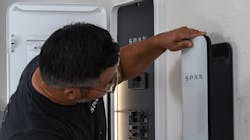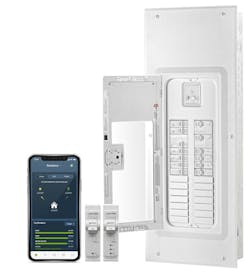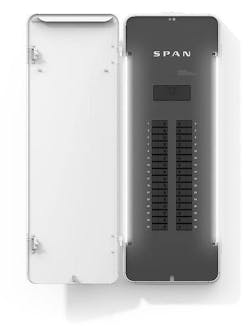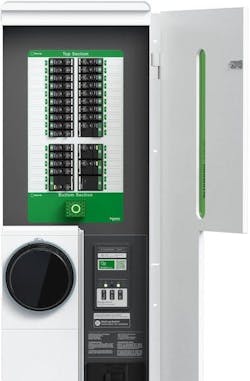The Emergence of Smart Load Panels
Among a widening range of sustainable design choices, alongside the installation of induction cooktops and EV chargers for electric vehicles, the transition to a clean energy future is becoming increasingly reliant on whole-home electrification. At the core of a home’s power system is its electrical panel, which distributes a home’s electricity to the various circuits that power lights, outlets, appliances, and other devices throughout the house.
According to some of the industry’s leading building products manufacturers (BPMs), the traditional electric panel, while undeniably effective at distributing power in the home, isn’t as sustainable as it could be. To solve that problem, companies like SPAN, Leviton, and Schneider Electric have recently rolled out what they believe to be a game changing solution: smart panels.
The Technology Behind the Smart Panel
Unlike traditional panels, smart panels can intelligently distribute power among various devices to ensure that the panel's capacity is never exceeded. Smart panels, like Leviton’s Whole Home Energy Monitor, are equipped with integrated or add-on software controls that provide the homeowner with additional information and capabilities beyond a traditional electrical panel.
“The Whole Home Energy Monitor enables features such as turning 2nd Gen Smart Circuit Breakers on/off from anywhere, scheduling breaker activity to benefit from reduced energy rate periods and automating the shedding of nonessential loads,” says Justin Berghoff, senior director of business development & product management for Leviton. “All these activities are conveniently available from a single source—the My Leviton app.”
The Whole Home Energy Monitor allows for direct monitoring of alternative energy sources such as solar, battery storage, and generators, providing homeowners with insights into their energy consumption and ways to reduce their energy output.
The Whole Home Energy Monitor offers precise user controls that go way beyond the capabilities of a traditional electrical panel.
Image: Leviton
SPAN’s smart panel uses off-the-shelf breakers and installs just like a traditional load panel. According to Karen Gough, SPAN's Vice President of Sales, it relies on “a combination of electromechanical current sensors in the panel and cloud-based software that allows for seamless home energy management from anywhere using the SPAN Home App for iOS and Android.”
Using the company’s PowerUp technology, SPAN’s panel tracks energy usage at the circuit level and automatically adjusts energy levels in the home, allowing builders to build all-electric homes without increasing service size. “During a hot day when the air conditioner is running, SPAN may give priority to the kitchen refrigerator and other essential circuits over an electric car charging circuit,” says Gough. “This means that the car charging speed may be throttled to maintain normal performance throughout the rest of the home.”
SPAN's smart panel uses electromechanical current sensors and cloud-based software to provide homeowners with the most up-to-date info about their energy consumption.
Image: SPAN
Similarly, Schneider Electric recently announced the launch of Schneider Home, an energy management solution that allows homeowners to connect to and control Schneider Pulse, a 200a smart electrical panel designed for retrofits and new-construction. The panel also works in tandem with Schneider’s home battery backup, a high-power solar inverter, an EV charger, and connected electric sockets and light switches. The entire system can be accessed remotely through the Schneider Home mobile app.
Putting the Panel Into Practice
At least as it relates to Leviton, SPAN, and Schneider Electric’s technologies, smart panels aren’t just for new homes. Smart load panels can be added to a new or existing home’s electrical system. Leviton's all-plug-on breaker design allows homeowners to replace standard circuit breakers with 2nd Gen Smart Circuit Breakers. In addition, basic and smart circuit breakers can be used interchangeably in the Leviton Load Center.
Schneider Home is a modular, flexible solution that includes new Square D Control Relays designed to snap directly onto the Square D QO Plug-on Neutral load centers, while the Schneider Energy Monitor can be added directly into the panel via a branch circuit at the same time.
“This solution allows builders nationwide to add smart panel functionality to new and existing electrical systems without the cost or disruption of a total smart panel replacement,” says Ben St. James, Schneider’s Residential Systems Offer Manager. “Commissioning for both devices can be done by the installer quickly, allowing the homeowner to monitor and control their energy use conveniently through the Schneider Home mobile app.”
Schneider Home allows users to track their energy usage through the Schneider Home app.
Image: Schneider Electric
Better for Homeowners, Better for the Environment
By allowing homeowners to visualize, control, and fine-tune their energy output, Leviton’s Whole Home Energy Monitor and the Schneider Home system aren’t just reducing utility costs, but they’re also minimizing real estate’s total carbon footprint, which accounted for 36% of global emissions in 2020.
“On the surface level, load centers are basic protection devices that have seen little to no innovation in decades,” Berghoff says. “The My Leviton app provides a unique opportunity to visualize and make adjustments to homeowners’ top-consuming breakers, like scheduling water heaters, hot tubs or pool pumps when away from the residence or to adjust an individual load like a single smart outlet or smart switch. Unifying with the electric vehicle charger further reduces consumer demand on fossil fuels.”
Not only do smart panels reportedly reduce each individual household’s carbon footprint, but according to Gough, they can also “help improve grid stability by automatically adjusting household energy consumption to avoid overloading the grid.”
Consolidated energy systems powered by smart panels provide homeowners with the ability to completely customize the electricity their homes generate and consume. As a modular solution, Schneider home’s energy package allows users to pick and choose the necessary tools for their homes, providing a level of flexibility that St. James says will make smart panel benefits accessible for a greater number of homeowners.
“Builders are looking for solutions that allow homebuyers to live more sustainably and save money on their electric bills,” he says. “Many new products come to market with that goal; however, they can come with a significant cost or may only be available in some areas. As a modular solution, Schneider Home can also be customized to meet specific needs, eliminating unnecessary parts and reducing costs further. This helps builders serve millions of homeowners with smart energy solutions.”
Impact on the Industry
Not only do smart panels create an opportunity for homeowners to make their existing homes more energy efficient, but Berghoff and St. James hope that new technology from Leviton and Schneider Electric, and really all smart panels, serves as a baseline for homes of the future.
Step one, according to Berghoff, is addressing the current outdated housing stock that contributes to high global carbon emissions: “The new dawn of electrification is here, today. And we have an immense housing stock today that needs to be addressed via retrofits, beyond just new home developments.”
From there, St. James says it’s up to home builders to use cleaner energy solutions in new-construction projects to make smart homes not just an increasingly viable opportunity, but a standard for all homebuyers: “We are looking to the builder community to lead the way by incorporating these solutions into their projects to deliver greener home options. We expect the market to respond positively because we know that sustainability is a focus for homebuyers and they are looking for homes that already come with those solutions.”



